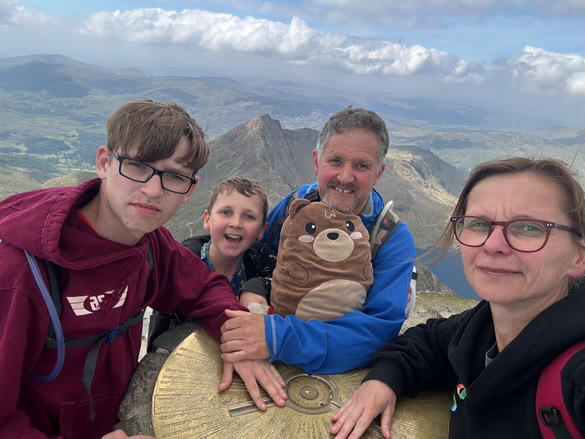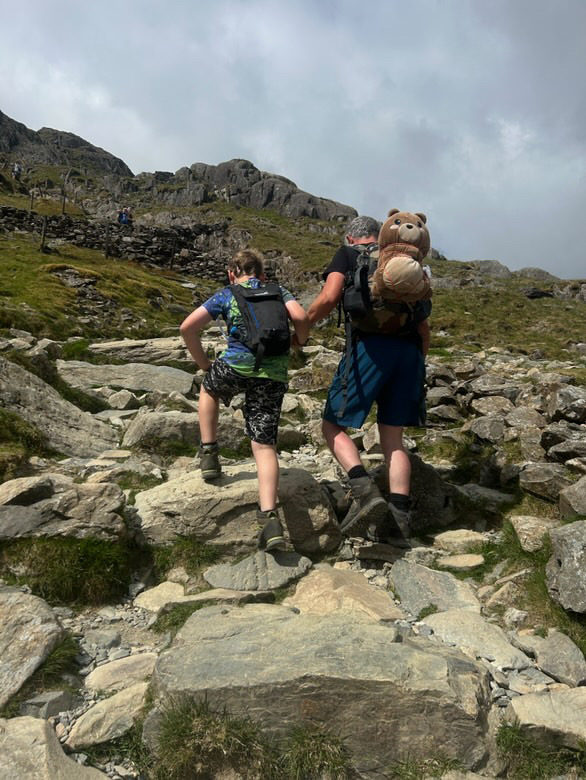
In the face of a cancer diagnosis families endure unimaginable challenges. Beyond the physical toll of treatment, the emotional and psychosocial impacts are profound. For over three decades, Kids Cancer Charity has been a beacon of support offering specialist Play Therapy and care breaks to children affected by cancer and their families. These services provide not just respite but also healing and hope. One of the most enduring ways to support this vital work is through legacy giving – a gift that continues to give long after it’s made.
Every year in the UK, approximately 1,900 children are diagnosed with cancer. The journey for families is long and arduous, filled with hospital visits, treatments and emotional strain. Amidst this turmoil, maintaining a sense of normalcy and emotional well-being becomes an additional challenge.
Kids Cancer Charity recognises that cancer affects the whole family. Working with children who have a cancer diagnosis, the siblings of children with a cancer diagnosis and children who have a family member with cancer or have been bereaved by cancer, our services go beyond medical treatment, addressing the emotional and psychological needs of both the child and their loved ones. Through Play Therapy and care breaks we provide children with a safe space to express their feelings and families with moments of respite to recharge and reconnect.
The power of Play Therapy
Play Therapy is a specialised form of psychotherapy that uses a child’s natural language of play to help children express their feelings, understand their experiences and develop coping mechanisms. For children undergoing cancer treatment, this form of therapy is invaluable. It allows them to process complex emotions in a safe and supportive environment, whether in hospital, at school or at home.
Our Play Therapy is tailored to each individual child’s needs, by engaging in play activities children can express things that may be too difficult to put into words. Play allows them to communicate at their own level and at their own pace, without feeling overwhelmed. When working with teenagers we may offer counselling as a preferred option of therapy. The teenager is very much in control of each session, talking about what they are ready to talk about. The goal is the same, to help children navigate their emotions and find a sense of control during a time when much of their life feels uncertain.
The importance of care breaks
Cancer treatment is not just physically demanding; it also takes an emotional toll on the entire family. Parents juggle hospital visits, work and caregiving, often at the expense of their own well-being. Siblings face having routines changed, their family split up through hospitalisation with some having to stay with relatives, the upheaval taking them away from their usual support networks, carrying with it a lot of worry, feelings of absence and anger at what’s going on for their family unit.
Care breaks offer families much-needed respite. These breaks provide families with the opportunity to step away from the daily stresses of treatment, spend quality together and create lasting memories.
“Just wanted to say a huge thank you for an amazing holiday! This time last year Jamie was going through intensive chemo, dealing with all of the nasty side effects, feeling sick, aching all over, at times unable to get out of bed or walk unaided to the bathroom. As a Mum I was heartbroken, we lived day by day. We couldn’t see any happy future ahead. But look at him now! I just can’t believe he climbed Snowdon, thanks to you we were able to build new happy memories. We finally had the chance to be together as a family! Last year we were split in half, always one of us away with Jamie for treatment, the other at home looking after Cody and trying to give him as normal a life as possible. Thank you from the bottom of my heart” Ania, Mum of Jamie and Cody.


Legacy giving: A gift that keeps on giving
Legacy giving, also known as planned or bequest giving, involves leaving a gift to a charity in your will. For Kids Cancer Charity, legacy gifts are a crucial source of funding that ensures the continuation and expansion of the service we provide.
By choosing to leave a legacy gift to Kids Cancer Charity, the donor is making a lasting impact on the lives of children and families affected by cancer. A gift from a will can fund essential Play Therapy sessions, provide care breaks for families and support the charities ongoing efforts to offer emotional and psychosocial support to those in need.
Legacy giving is not just about financial support; it’s about leaving a legacy of compassion, hope and healing. It’s a way to ensure that future generations have access to the support they needs during one of the most challenging times of their lives.
The impact of a legacy gift
In addition to the direct benefits, legacy gifts also inspire others to contribute. Knowing that individuals have chosen to leave a lasting legacy encourages others to consider how they can support the cause, causing a ripple effect of generosity and compassion.
The impact of legacy gifts is not just seen in financial terms but in the stories of the children and families who benefit from the charity’s services. For example, consider Cai who is currently six years old and has just finished 3 years of treatment for leukaemia during which time the charity has provided play therapy as Cai was in fear of having finger pricks, suffering nightmares and having sudden emotional outbursts since his treatment started.
At age 2, Cai was a lively, outgoing toddler but over the course of one week during Christmas all this changed when Cai became extremely sleepy and pale with bruises developing on his legs and he complained of pain when walking. Saying his symptoms out loud was very frightening for the family, made all the more real when his blood tests indicated he had cancer. Immediately Cai was moved to hospital where he had treatment to protect his stomach in preparation for chemotherapy. Two days later he had a bone marrow aspiration and Lymphocytic Leukaemia was confirmed. Chemotherapy was started that same day.
Terrified, Cai and his parents were thrown into turmoil, very quickly having to comply to his new surroundings whilst the daunting prospect of what was to follow hung over them, not the Christmas they had envisaged at all. During his first month of treatment Cai became a different child, scared by all that was going on and his new surroundings our Play Therapist began work in his home using first aid kits and equipment to enable him to safely play out his worries and help Cai master his fears. Working in their natural non-directive way Cai’s trust was gained within the first few sessions, helping Cai to adjust to planned medical interventions. Through drawings of his nightmares and the use of dream catchers, Cai was helped to overcome the blockage that was being experienced and along with recommended good sleep hygiene techniques his parents saw positive significant results. Cai gained not only mastery and a sense of control in situations but also autonomy and independence.
Not long after Cai’s diagnosis his sister Mai was born and in the process of trying to integrate Cai into school he struggled when having to spend so much time isolating when other pupils got sick; Cai would become silent, sullen and angry, often hitting out at his younger sister Mai. At times of isolation play therapy was conducted via phone, face time or zoom. Playing games online, finding ways to communicate through the play it was incredible how Cai adapted; characters that were created by using story dice fully utilised the depths of his imagination encouraging his incredible talent at reaching visualization. Cai had become incredibly resilient and became so brave that he helped other children on the hospital ward.
Our Play Therapist has noted how Cai can now easily regulate his emotions. Cai’s parents are struck by the huge contrast between how Cai is now to how he was when this journey began; ‘there was a time when it took 7 people to hold him down so that they could perform a procedure’ and they are ‘struck how confident and funny he has become’.
Leaving a legacy of compassion
Choosing to leave a legacy gift to Kids Cancer Charity is more than a financial decision; it’s a statement of compassion and commitment to improving the lives of children and families affected by cancer. A legacy gift ensures that future generations have access to the support they need to navigate the challenges of cancer with hope and resilience.
As people consider legacy, we hope they consider the lasting impact it can have. A legacy gift is a powerful way to make a difference, provide support, comfort and hope to those who need it most. In the battle against cancer and the impact on the children it affects, every act of kindness counts. By leaving a gift to Kids Cancer Charity, you are not just donating money; you are leaving a legacy of hope, healing and compassion.
For more information on how to leave a legacy gift, visit https://www.kidscancercharity.org/gifts-in-wills/ or contact enquiries@kidscancercharity.org Your support can make a world of difference.
At The Farewell Guide, we understand that planning ahead is an act of love. Many people choose to include a note in their funeral plan asking for donations to a charity close to their heart, like Kids Cancer Charity, instead of flowers – a simple gesture that can have a lasting impact. We can help you include wishes like this in your plan, while also making it easier to compare funeral director prices and find the right fit for you and your family. It’s about making thoughtful choices now, so everything feels a little simpler later on.
If you’d like to explore your options or start putting your plan in place, we’re here to help – whenever you're ready.
Related Articles:
10 Alternatives to Sympathy Flowers
What is Estate Planning?
Who is Next of Kin? And other common questions